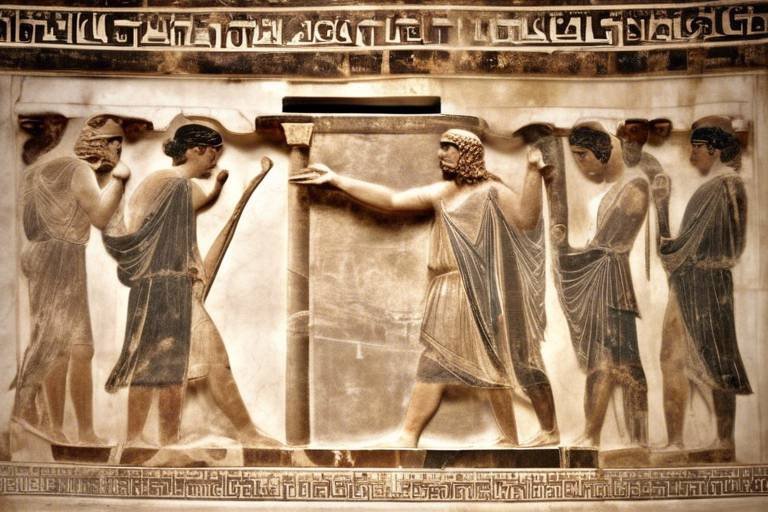The Mystery of the Ancient Greeks' Understanding of Philosophy
The ancient Greeks were pioneers in the realm of philosophy, embarking on a journey of intellectual exploration that continues to captivate and inspire to this day. Their profound insights into the nature of existence, knowledge, and ethics laid the foundation for Western philosophical thought. But what mysteries shroud the origins of Greek philosophy, and how did it shape the course of human understanding?

Origins of Greek Philosophy
Exploring the origins of Greek philosophy unveils a fascinating journey into the intellectual landscape of ancient Greece. It all began in the 6th century BCE, a time of great intellectual awakening where thinkers sought to understand the fundamental nature of reality and existence. The quest for wisdom led to the birth of philosophy, marking a pivotal moment in human history.
The roots of Greek philosophy can be traced back to the Ionian coast, where thinkers like Thales, Anaximander, and Anaximenes pondered the nature of the universe and the elements that compose it. These early philosophers laid the groundwork for critical inquiry and rational thought, setting the stage for the development of philosophical discourse in Greece.
Thales, often considered the first philosopher, proposed that water was the fundamental substance of the cosmos. Anaximander introduced the concept of the boundless "apeiron" as the source of all things, while Anaximenes posited that air was the primary element. These diverse perspectives marked the beginning of a philosophical tradition that would flourish in the centuries to come.
As Greek city-states prospered and expanded, philosophical inquiry spread across the region, with thinkers from different backgrounds and disciplines contributing their unique insights. The vibrant exchange of ideas and the spirit of intellectual curiosity fueled the growth of Greek philosophy, shaping its diverse and multifaceted nature.
Over time, philosophical schools emerged in various cities, each with its own distinctive approach to understanding the world. From the Eleatics in Southern Italy to the Sophists in Athens, Greek philosophy evolved into a rich tapestry of thought, encompassing metaphysics, ethics, epistemology, and more.
The origins of Greek philosophy reflect a profound desire to unravel the mysteries of existence and the cosmos, laying the foundation for a tradition of inquiry that continues to inspire and captivate minds to this day.

Key Philosophers and Schools
When delving into the realm of ancient Greek philosophy, one cannot overlook the significant contributions of key philosophers and the philosophical schools they established. These intellectual giants paved the way for the development of Western philosophical thought and continue to influence contemporary discourse.
One of the most renowned figures in Greek philosophy is Socrates, whose Socratic method of inquiry revolutionized the way philosophical discussions were conducted. By posing probing questions that challenged conventional beliefs, Socrates encouraged critical thinking and self-examination among his followers.
Another pivotal figure is Aristotle, a polymath whose contributions spanned across various disciplines. Aristotle's logical framework and metaphysical inquiries laid the foundation for Western philosophy, while his empirical approach to the natural sciences advanced human understanding of the physical world.
Among the notable philosophical schools that emerged in ancient Greece, the Platonic Academy founded by Plato stands out. This institution served as a hub for intellectual discourse and philosophical exploration, nurturing generations of thinkers who would shape the course of philosophical history.
Furthermore, the Peripatetic School established by Aristotle carried on his philosophical legacy, focusing on the study of ethics, metaphysics, and natural philosophy. The school's emphasis on systematic inquiry and empirical observation influenced generations of scholars and philosophers.
These key philosophers and schools not only contributed profound insights to the field of philosophy but also fostered a culture of intellectual inquiry and debate that continues to resonate in contemporary philosophical discourse.

Socratic Method and Ethics
The Socratic Method is a powerful tool that Socrates, one of the most renowned Greek philosophers, employed in his philosophical inquiries. Rather than providing direct answers, Socrates engaged in thought-provoking dialogues with his interlocutors, leading them to question their own beliefs and assumptions. This method of questioning, also known as elenchus, aimed to stimulate critical thinking and self-reflection, challenging individuals to examine the logical consistency of their arguments and the underlying principles of their ethical beliefs.
Through the Socratic Method, Socrates sought to uncover universal truths and moral principles that could guide individuals towards a virtuous life. By questioning commonly held beliefs and exposing contradictions in reasoning, Socrates encouraged his students to think deeply about the nature of justice, piety, and the good life. His emphasis on self-examination and intellectual humility laid the foundation for ethical inquiry and philosophical reflection in Western thought.
Moreover, Socrates' ethical teachings emphasized the importance of living a life of integrity, guided by reason and moral virtue. He believed that true wisdom lies in acknowledging one's own ignorance and constantly seeking to improve oneself through self-examination and dialogue. Socrates famously proclaimed, "The unexamined life is not worth living," highlighting the necessity of introspection and philosophical inquiry in the pursuit of a meaningful existence.

Aristotelian Logic and Metaphysics
Aristotle, one of the most renowned figures in ancient Greek philosophy, made significant contributions to the fields of logic and metaphysics. His work in these areas laid the foundation for Western philosophical thought for centuries to come. Aristotle's logical system, known as syllogism, revolutionized the way people approached reasoning and argumentation. By establishing rules for valid deductions, Aristotle provided a framework for clear and structured thinking. This logical framework not only influenced philosophy but also had a profound impact on fields such as science and mathematics.
In addition to his work in logic, Aristotle delved deeply into metaphysics, the branch of philosophy concerned with the nature of reality and existence. He proposed the concept of substance as the underlying essence of all things, distinguishing between primary substances (individual entities) and secondary substances (universal concepts). Aristotle's metaphysical inquiries sought to understand the fundamental principles that govern the universe, exploring questions of causality, teleology, and the nature of being itself.
Aristotle's exploration of metaphysics extended to the study of ontology, the branch of metaphysics dealing with the nature of being and existence. Through his systematic approach, Aristotle sought to uncover the ultimate truths about the universe and humanity's place within it. His metaphysical theories influenced subsequent philosophical developments, shaping the way thinkers contemplated the nature of reality, the divine, and the human soul.

Philosophical Concepts in Greek Society
Philosophical Concepts in Greek Society were not confined to the ivory towers of academia but permeated every aspect of ancient Greek life. The philosophical ideas of the time influenced how individuals interacted with each other, viewed the world, and structured their society. One of the fundamental concepts that had a profound impact on Greek society was the idea of arete, which emphasized the pursuit of excellence and virtue in all aspects of life. This concept shaped the moral fabric of Greek society, influencing behavior, ethics, and social norms.
Moreover, the Greek philosophical emphasis on episteme, or knowledge, played a crucial role in shaping the educational system and intellectual pursuits of the time. The Greeks valued knowledge and wisdom, and this philosophical ideal led to the establishment of schools and academies where individuals could engage in intellectual discourse and pursue a deeper understanding of the world.
Another significant philosophical concept that influenced Greek society was the idea of phronesis, or practical wisdom. This concept emphasized the importance of practical reasoning and sound judgment in everyday decision-making. It guided how individuals approached ethical dilemmas, political issues, and personal matters, shaping the moral compass of Greek society.
Furthermore, the Greek philosophical tradition of philanthropia, or love of humanity, underscored the importance of compassion, empathy, and social responsibility. This concept promoted the idea of caring for others, fostering a sense of community and solidarity within Greek society.
The interplay of these philosophical concepts in Greek society created a rich tapestry of values, beliefs, and behaviors that continue to resonate in modern civilization. The legacy of Greek philosophy in shaping societal norms, ethical standards, and intellectual pursuits is a testament to the enduring impact of ancient Greek thought.

Political Philosophy and Democracy
Political philosophy and democracy in ancient Greece were intricately intertwined, shaping the very foundation of Western political thought. The great philosophers of the time, such as Plato and Aristotle, pondered over the ideal form of governance and the role of the individual within the state. They grappled with questions of justice, equality, and the nature of power, laying the groundwork for the democratic principles we cherish today.
Plato, through his seminal work "The Republic," delved into the concept of a just society governed by philosopher-kings. He envisioned a hierarchical system where individuals were assigned roles based on their abilities, with the ultimate goal of achieving harmony and justice within the state. Plato's allegory of the cave metaphorically illustrates the journey from ignorance to enlightenment, emphasizing the importance of knowledge and wisdom in governance.
Aristotle, a student of Plato, approached political philosophy from a more empirical standpoint. He believed that the best form of government is a mixed constitution that blends elements of monarchy, aristocracy, and democracy. Aristotle's concept of the "polis" as a community of citizens bound by common values and laws laid the groundwork for the development of democratic institutions.
A key aspect of Greek political philosophy was the emphasis on civic participation and the idea of the "polis" as a collective entity where individuals had a stake in decision-making. Democracy, derived from the Greek words "demos" (people) and "kratos" (rule), emerged as a revolutionary concept that empowered citizens to govern themselves collectively.
Aristotle's classification of political systems into monarchy, aristocracy, and polity (a form of democracy) highlighted the importance of balance and moderation in governance. He warned against the pitfalls of tyranny and oligarchy, advocating for a system that upholds the rule of law and protects the interests of all citizens.
Ancient Greek political philosophy not only laid the groundwork for modern democratic principles but also sparked debates that continue to resonate in contemporary politics. The tension between individual rights and the common good, the role of the state in promoting justice and equality, and the mechanisms of governance are all enduring themes that originated in the philosophical discourse of ancient Greece.

Cosmology and Philosophy of Nature
When we delve into the realm of Cosmology and Philosophy of Nature in ancient Greek philosophy, we are transported to a time where the natural world was intertwined with the divine. The Greeks, with their insatiable curiosity and deep reverence for nature, sought to unravel the mysteries of the cosmos and understand the essence of existence itself.
For the ancient Greeks, the study of cosmology was not merely a scientific endeavor but a philosophical quest to comprehend the order and beauty of the universe. From the pre-Socratic philosophers' speculations on the fundamental elements of nature to Aristotle's systematic exploration of the natural world, Greek thinkers pondered the intricate connections between the physical realm and the metaphysical realm.
Aristotle, often regarded as the father of natural philosophy, proposed a comprehensive framework for understanding the natural world through his theories on causality, teleology, and the hierarchy of beings. His concept of the "Unmoved Mover" as the ultimate cause of motion and change in the cosmos laid the foundation for centuries of philosophical inquiry into the nature of existence and the divine.
Moreover, the Greek philosophers' contemplation of nature extended beyond the physical world to encompass ethical and metaphysical considerations. The interconnectedness of all things, the harmony of the cosmos, and the cyclical patterns of nature were central themes in Greek cosmology, reflecting a holistic worldview that resonated throughout their philosophical teachings.
Through their exploration of cosmology and the philosophy of nature, the ancient Greeks not only laid the groundwork for scientific inquiry but also fostered a deep appreciation for the interconnectedness of all life forms and the profound beauty of the natural world. Their legacy continues to inspire us to ponder the mysteries of the universe and contemplate our place within the grand tapestry of existence.

Legacy of Greek Philosophy
The legacy of Greek philosophy is a profound and enduring one, shaping the course of intellectual thought and civilization for centuries to come. The contributions of ancient Greek philosophers have left an indelible mark on various aspects of human society, influencing fields as diverse as politics, ethics, and science.
One of the most significant legacies of Greek philosophy is the emphasis on rational inquiry and critical thinking. Philosophers like Socrates, Plato, and Aristotle laid the foundation for a systematic approach to understanding the world around us, encouraging future generations to question, analyze, and seek truth through logical reasoning.
Furthermore, the legacy of Greek philosophy extends to the realm of ethics and morality. The ethical teachings of philosophers such as Socrates, who famously declared that "an unexamined life is not worth living," continue to inspire individuals to reflect on their values, actions, and choices in pursuit of a virtuous life.
Moreover, the influence of Greek philosophical concepts can be seen in the development of political thought and governance. The ideas of democracy, citizenship, and the role of the individual in society, espoused by thinkers like Plato and Aristotle, have shaped the foundations of modern political systems and ideals of social justice.
In addition to politics and ethics, the legacy of Greek philosophy reverberates through the realms of science and metaphysics. The works of Aristotle on logic, metaphysics, and the natural sciences laid the groundwork for the scientific method and our understanding of the physical world, while also delving into profound questions about the nature of reality and existence.
Overall, the legacy of Greek philosophy serves as a testament to the enduring power of human intellect and curiosity. By challenging assumptions, exploring new ideas, and seeking deeper truths, ancient Greek philosophers have bequeathed a rich intellectual heritage that continues to inspire, provoke, and enlighten minds across the globe.
Frequently Asked Questions
- What is Greek philosophy?
Greek philosophy refers to the intellectual tradition developed by ancient Greek thinkers, focusing on fundamental questions about existence, knowledge, ethics, and the nature of reality.
- Who were some of the key Greek philosophers?
Prominent Greek philosophers include Socrates, Plato, and Aristotle, each known for their unique contributions to philosophical thought and shaping the foundations of Western philosophy.
- What is the Socratic method?
The Socratic method is a form of cooperative argumentative dialogue used by Socrates to stimulate critical thinking and illuminate ideas through a series of questions and answers.
- How did Greek philosophy influence politics?
Greek philosophers such as Plato and Aristotle significantly impacted political theory by exploring concepts of justice, governance, and the ideal state, laying the groundwork for modern political thought.
- What is the legacy of Greek philosophy in modern times?
The legacy of Greek philosophy can be seen in various fields such as science, ethics, politics, and metaphysics, continuing to shape contemporary philosophical discourse and societal values.



















